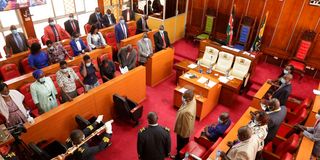
A special plenary session at the Siaya County Assembly on February 3, 2021.
County Assembly Speakers across the country are finding themselves in an increasingly precarious position as Members of County Assemblies (MCAs) use impeachment as a means of exerting influence and pressure.
Once seen as neutral arbiters of county assemblies, Speakers have now become the new targets in a power struggle that is shifting away from governors.
Unlike governors, who are elected directly by the people, Speakers are elected by MCAs, making them easier to remove when their decisions do not align with the interests of ward representatives.
This trend is evident in several counties where Speakers have been impeached or forced to resign amid allegations that their removal is often driven by political power plays rather than genuine misconduct.
In counties such as Nyamira, Turkana, Homa Bay, Migori, and Taita Taveta, Speakers have been ousted or pressured to leave under circumstances that raise concerns about the misuse of impeachment powers.
Many Speakers interviewed by Nation say they live in fear, knowing that their survival in office depends on the goodwill of MCAs, who wield the power to remove them at any time.
“MCAs are using impeachment threats to arm-twist House Speakers and sometimes even the county executive to yield to their demands. It is a dangerous precedent being set in counties, but we have been forced to submit and live with it,” revealed a Speaker from Nyanza who sought anonymity, fearing backlash from MCAs.
In some counties, Speakers are expected to yield to MCAs’ demands or face impeachment threats.
Some of these demands include approving financial benefits such as car loans and mortgages for MCAs.
Refusal can lead to accusations of misconduct.
Governance experts warn that impeachment powers are increasingly being used as a tool of blackmail, undermining devolution and disrupting service delivery.
According to political analyst David Ngugi, the unchecked use of impeachment by MCAs is setting a dangerous precedent that could destabilize county operations and negatively impact the electorate. He argues that the law should be reviewed to prevent impeachment from being used for personal or political gain.
“The impeachment powers given to MCAs should now be seen as a serious threat to devolution. If not controlled, they will derail service delivery in devolved units. In most cases, MCAs are using the impeachment process as a weapon to arm-twist Speakers and county executives into yielding to their demands,” Mr Ngugi told Nation.
“In many counties, MCAs have turned into lynch mobs, setting a dangerous precedent. These impeachments, coupled with persistent fights between executives and assemblies, must be tamed because they destabilize county operations and leave the electorate suffering,” he
added.
Under the current legal framework, a Speaker can be removed from office through a resolution supported by at least two-thirds of all MCAs.
Grounds for impeachment include gross violation of the Constitution, incompetence, abuse of office, gross misconduct, or a criminal conviction leading to a sentence of at least six months.
Once a motion is filed, a special committee of five MCAs investigates the charges and files a report within ten days.
The Speaker has the right to appear and be represented before the select committee during its investigations.
If the allegations are found unsubstantiated, the process ends there. If they are substantiated, the assembly votes on whether to remove the Speaker.
In Nyamira County, a leadership battle has led to two rival Speakers—one elected and the other reinstated by the court.
Speaker Enock Okero was impeached on October 24 last year, with 23 MCAs supporting his removal over alleged misconduct.
He challenged the decision in court, which reinstated him, but MCAs have barred him from office.
The crisis escalated with parallel assembly sittings, and in December, Thaddeus Nyabaro was elected as the new Speaker.
Mr Okero's allies claim he was targeted for blocking Governor Amos Nyaribo’s impeachment.
In Homa Bay, Speaker Julias Gaya resigned in November 2023 ahead of an impeachment motion, and Polycarp Okombo was elected in his place.
In Migori, Speaker Owino Likowa was removed on April 23, 2024, and replaced by Christopher Rusana in May.
Taita Taveta's Speaker Wisdom Mwamburi is in court contesting his ouster last July.
Other counties have faced similar turmoil.
In Kericho, MCAs attempted to impeach Speaker Patrick Mutai over alleged misconduct, but the motion was dropped after negotiations.
In Elgeyo Marakwet, Speaker Philemon Sabulei resigned in January after securing a national government role, with Lawi Kibire replacing him.
The political fights in the county assemblies have also drawn in county executive committee members and assembly majority leaders, further destabilizing county governments.
Governors have been accused of using MCAs to remove Speakers they perceive as threats to their political influence.
In response to the growing misuse of impeachment, Kiambu Senator Karungo Thangwa has introduced a Bill in the Senate seeking to establish a clear legal framework for removing county officials from office.
The County Governments (State Officers Removal from Office Procedure) Bill, 2024, aims to prevent impeachments based on flimsy or politically motivated grounds.
If passed, the Bill would ensure that accused officials receive a fair hearing and that due process is followed before they can be removed.
Senator Thangwa argues that tightening the impeachment process is necessary to protect Speakers, governors, deputies, and county executive members from being ousted based on personal vendettas rather than genuine accountability concerns.
“The Bill seeks to tighten the threshold for the ouster of senior county and assembly officials, safeguarding them from the wrath of MCAs, who sometimes introduce impeachment motions based on witch-hunts and flimsy grounds due to the low threshold,” said Mr Thangwa.
Another proposed solution to curb political instability in county assemblies is granting financial autonomy to county assemblies.
Kiambu County Assembly Speaker Charles Thiong’o, who is also a lawyer, believes that many impeachment attempts are linked to financial disputes between assemblies and county executives.
He argues that county assemblies lack control over their finances, leaving them vulnerable to manipulation by governors.
Mr Thiong’o supports ongoing efforts by the Senate to push for financial independence for county assemblies, a move that would allow them to receive funds directly from the National Treasury rather than through county governments.
“County assembly finances are still under the control of the county executive, which is why we have been pushing for financial autonomy so that assemblies can receive their funds directly from the exchequer,” he added.
The lack of financial autonomy has been a significant source of conflict, with Speakers often blamed for budgetary constraints beyond their control. In some cases, MCAs have sought to impeach Speakers over delayed disbursement of salaries and allowances, despite the real issue lying with the delayed release of funds by the National Treasury.
The ongoing friction between MCAs, Speakers, and the executive has fuelled instability in county governments, with some arguing that better facilitation and remuneration for MCAs could help ease tensions.
“MCAs are the least facilitated among state officers. We have been pushing for a review of their terms, including job evaluation, to enable them to effectively discharge their functions. We have also been pushing for a Ward Fund for MCAs to be entrenched in law, just like the National Government Constituency Development Fund (NG-CDF), National Government Affirmative Action Fund (NGAAF), and the proposed Senate Oversight Fund for Senators,” he said.
A Speaker from the Mount Kenya region echoed similar sentiments, saying Speakers must carefully navigate assembly politics to avoid becoming scapegoats in conflicts between MCAs and the county executive.
“If you fail to yield to MCAs’ demands—which are sometimes outrageous—they accuse you of gross misconduct and abuse of office. Your fate is then determined on the floor of the House. If the majority of MCAs vote for your removal, your goose is cooked. In most cases, Speakers are just scapegoats who have to be punished,” he added.
While some Speakers have spoken out about the pressures they face, others have been forced to maintain a low profile. One Speaker admitted that he avoids controversy to protect himself.
Another Speaker from a Mt Kenya county declined an interview, only saying, “I always prefer to play it cool. I don’t want to speak on anything because mine is one of the most volatile assemblies. Staki kuwasha moto… (I don’t want to start a conflict).”
In one South Rift county, a Speaker revealed that he was almost impeached for failing to approve MCAs’ mortgages and car loans.
The ward representatives accused him of gross misconduct and misusing county funds for personal gain.
“I was almost impeached because I refused to approve MCAs’ mortgages and car loans. I was accused of gross misconduct, abuse of office, and using county assembly funds for personal benefit,” he revealed.









